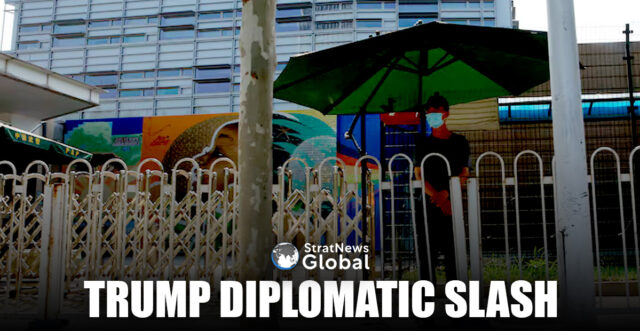The United States plans to reduce the size of its diplomatic mission in China by up to 10%, according to a report from the South China Morning Post on Wednesday, citing sources familiar with the matter.
American diplomats working in mainland China and Hong Kong, as well as local employees, might be given notice as early as Friday in a round of downsizing that the media outlet described as unprecedented.
Uncertain Future
The cuts would affect the embassy in Beijing and the consulates in Guangzhou, Shanghai, Shenyang and Wuhan, as well as the consulate in Hong Kong, the South China Morning Post said.
It was not clear whether any of those affected would be reassigned elsewhere in the diplomatic service, but layoffs are expected, it added.
President Donald Trump’s administration has asked U.S. embassies worldwide to prepare for staff cuts, sources told Reuters last week, as part of the Republican president’s effort to overhaul the U.S. diplomatic corps. Trump and his billionaire ally Elon Musk have been making efforts to cut U.S. government spending that they consider wasteful since Trump took office on January 20.
The U.S. State Department had no immediate comment.
The United States has a large diplomatic workforce in China and those in Beijing are located in a 10-acre site consisting of six buildings, including a new annex completed in 2016.
According to the website of the U.S. Embassy and Consulates in China, the Beijing embassy complex houses more than 1,300 American and locally-hired staff representing almost 50 different U.S. federal agencies.
Dissatisfied With U.S. Tariffs
Meanwhile, Chinese Commerce Minister Wang Wentao has expressed strong dissatisfaction with U.S. tariffs on Chinese goods in a letter addressed to the newly confirmed U.S. Commerce Secretary Howard Lutnick, the ministry said on Wednesday.
Wang sent the letter to Lutnick on Wednesday to congratulate him on his confirmation, according to the ministry.
“The move by the U.S. to unilaterally impose tariffs undermined normal economic and trade cooperation between China and the U.S.,” Wang said in the letter.
Trump imposed a sweeping 10% tariffs on all Chinese imports in early February, saying Beijing needed to staunch the flow of fentanyl, a deadly opioid, into the United States. U.S. administrations have been urging China to crack down on shipments of a China-made precursor chemical needed to make the drug. Beijing, which has brushed off the opioid use as the United States’ problem, responded with retaliatory tariffs and filed a WTO dispute against Washington.
In his letter Wang said China was willing to work with the U.S. to “strengthen dialogue, manage differences, promote cooperation” and hoped to create a “fair and predictable policy environment” for the two countries’ business communities to cooperate.
“China hopes to resolve respective concerns through equal dialogue and consultation,” he said.
On the issue of fentanyl, China says it has taken significant steps to crack down on the chemicals and the illicit drug trade and Wang said the two countries have carried out “extensive and in-depth” cooperation in controlling the drug and achieved considerable results.
(With inputs from Reuters)





